
Queen are a British rock band formed in London in 1970 by Freddie Mercury, Brian May, and Roger Taylor, later joined by John Deacon (bass). Their earliest works were influenced by progressive rock, hard rock, and heavy metal, but the band gradually ventured into more conventional and radio-friendly works by incorporating further styles, such as arena rock and pop rock.
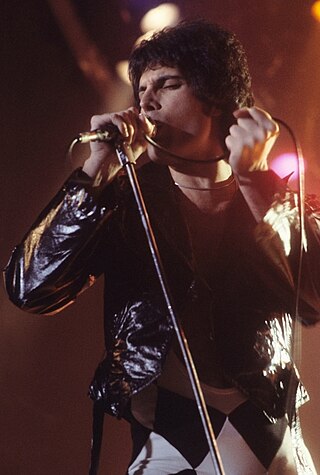
Freddie Mercury was a British singer and songwriter who achieved worldwide fame as the lead vocalist and pianist of the rock band Queen. Regarded as one of the greatest singers in the history of rock music, he was known for his flamboyant stage persona and four-octave vocal range. Mercury defied the conventions of a rock frontman with his theatrical style, influencing the artistic direction of Queen.

The Freddie Mercury Tribute Concert for AIDS Awareness was a benefit concert held on Easter Monday, 20 April 1992, at Wembley Stadium in London, England, for an audience of 72,000. The concert was produced for television by Ray Burdis, directed by David Mallet and broadcast live on television and radio to 76 countries around the world, with an audience of up to one billion. The concert was a tribute to Queen's lead vocalist, Freddie Mercury, who died of AIDS on 24 November 1991.

George Michael was an English singer-songwriter, record producer and philanthropist. Regarded as a pop culture icon, he is one of the best-selling musicians of all time, with his sales estimated at between 100 million to 125 million records worldwide. Michael was known as a creative force in songwriting, vocal performance, and visual presentation. He achieved 10 number-one songs on the US Billboard Hot 100 and 13 number-one songs on the UK Singles Chart. Michael won numerous music awards, including two Grammy Awards, three Brit Awards, twelve Billboard Music Awards, and four MTV Video Music Awards. He was listed among Billboard's the "Greatest Hot 100 Artists of All Time" and Rolling Stone's the "200 Greatest Singers of All Time". The Radio Academy named him the most played artist on British radio during the period 1984–2004. Michael was inducted into the Rock and Roll Hall of Fame in 2023.

"Under Pressure" is a song by the British rock band Queen and singer David Bowie. Originally released as a single in October 1981, it was later included on Queen's 1982 album Hot Space. The song reached number one on the UK Singles Chart, becoming Queen's second number-one hit in their home country and Bowie's third, and also charted in the top 10 in more than 10 countries around the world.
The Mercury Phoenix Trust is a charity organisation that fights HIV/AIDS worldwide.

Paul Antony Young is an English musician, singer and songwriter. Formerly the frontman of the short-lived bands Kat Kool & the Kool Cats, Streetband and Q-Tips, he became a teen idol with his solo success in the 1980s. His hit singles include "Love of the Common People", "Wherever I Lay My Hat", "Come Back and Stay", "Every Time You Go Away" and "Everything Must Change", all reaching the top 10 of the UK Singles Chart. Released in 1983, his debut album, No Parlez, was the first of three UK number-one albums.

Innuendo is the fourteenth studio album by the British rock band Queen, released on 4 February 1991 by Parlophone in the United Kingdom and it is the band's first studio album to be released by Hollywood Records in the United States. Produced by David Richards and the band, it was the band's last album to be released in lead singer Freddie Mercury's lifetime, and their most recent one to be composed of entirely new material, save for The Cosmos Rocks by the Queen + Paul Rodgers collaboration. It reached the No. 1 spot on the UK album charts for two weeks, and also peaked at No. 1 in Italy, the Netherlands, Germany, and Switzerland, staying at No. 1 for three weeks, four weeks, six weeks, and eight weeks, respectively. It was the first Queen album to go Gold in the US upon its release since The Works in 1984.

"I Want to Break Free" is a song by the British rock band Queen, written by their bassist John Deacon. It appears on the album The Works (1984), and was released in three versions: album, single and extended. The track became a staple of the band's 1984–85 Works Tour and their 1986 Magic Tour.

"These Are the Days of Our Lives" is a song by the British rock band Queen. Although credited to the whole band, it was largely written by their drummer Roger Taylor, and is the eighth track on the band's 1991 album Innuendo.
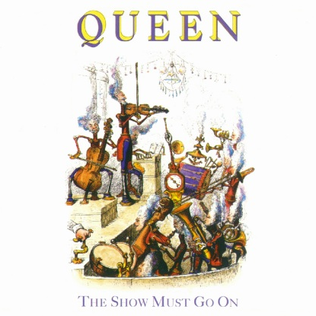
"The Show Must Go On" is a song by British rock band Queen, featured as the twelfth and final track on their 1991 album, Innuendo. It is credited to Queen, but written mainly by Brian May. The song chronicles the effort of frontman Freddie Mercury continuing to perform despite approaching the end of his life, although his diagnosis with HIV/AIDS had not yet been made public in spite of ongoing media speculation claiming that he was seriously ill. When the band recorded the song in 1990, Mercury's condition had deteriorated to the point that May had concerns as to whether he was physically capable of singing it. May recalls; "I said, 'Fred, I don't know if this is going to be possible to sing.' And he went, 'I'll fucking do it, darling'—vodka down—and went in and killed it, completely lacerated that vocal".
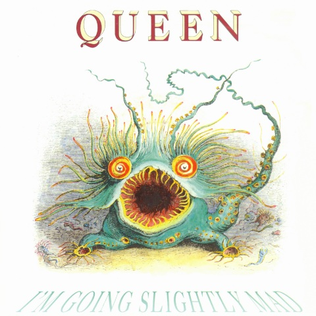
"I'm Going Slightly Mad" is a song by the British rock band Queen. Written by Freddie Mercury but credited to Queen, with uncredited lyrical contributions by Peter Straker, it was released as the second single from the band's 1991 album Innuendo. The song was released as a single on 4 March 1991, a month after the release of the album. The lyrics and the accompanying music video project the song as humorous and lighthearted, despite the lyrics dealing with the mental decline Mercury was experiencing as one of the effects of advancing AIDS.

"Who Wants to Live Forever" is a song by the British rock band Queen. A power ballad, it is the sixth track on the album A Kind of Magic, which was released in June 1986, and was written by lead guitarist Brian May for the soundtrack to the film Highlander. Queen was backed up by an orchestra, with orchestrations by film score composer Michael Kamen. The song peaked at No. 24 in the UK charts. In 1991, it was included in the band's second compilation album Greatest Hits II.
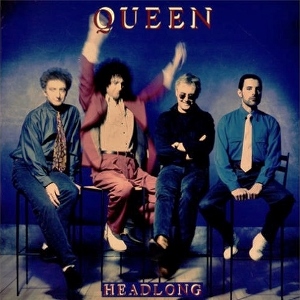
"Headlong" is a song by British rock band Queen, released as the third single from their fourteenth studio album, Innuendo (1991). The song was written by Queen guitarist Brian May, who intended to record it for his then-upcoming solo album Back to the Light (1992), but when he heard Queen lead singer Freddie Mercury sing the track, he allowed it to become a Queen song. As with all the songs on Innuendo, the track was promptly credited to the entire band.

John Richard Deacon is an English retired musician best known for being the bass guitarist for the rock band Queen. He wrote several songs for the group, including Top 10 hits "You're My Best Friend", "Another One Bites the Dust" and "I Want to Break Free"; co-wrote "Under Pressure", "Friends Will Be Friends" and "One Vision"; and he was involved in the band's financial management.
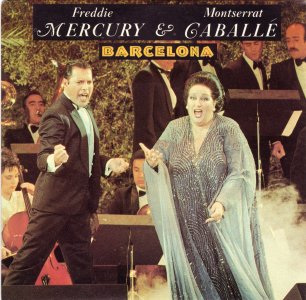
"Barcelona" is a single released by Queen vocalist Freddie Mercury and operatic soprano Montserrat Caballé. A part of their collaborative album Barcelona, it also appeared on Queen's Greatest Hits III.

"In My Defence" is a song performed by Queen lead vocalist Freddie Mercury. It was from the 1986 musical Time by Dave Clark and featured on the Time concept album. The song was not a hit during Mercury's lifetime but was released posthumously in November 1992, reaching number eight on the UK Singles Chart.
Brit Awards 1990 was the tenth edition of the Brit Awards, an annual pop music awards ceremony in the United Kingdom. It was organised by the British Phonographic Industry and took place on 18 February 1990. The ceremony was held at the Dominion Theatre in London for the first time, having previously been held at the Royal Albert Hall, and was hosted by Cathy McGowan.

Rudi Dolezal is an Austrian film producer and film director best known for his music videos. He has directed and produced videos for artists such as Tom Waits, the Rolling Stones, Frank Zappa, David Bowie, Michael Jackson, Bruce Springsteen, Sandra Cretu and Whitney Houston.



















